(ECNS)-- The year 2022 marks the 50th anniversary of the establishment of diplomatic relations between China and Germany. As the most important economy of the European Union (EU), Germany has practical cooperation with China in the field of economic and trade investment, and the cooperation has become an important anchor for promoting the stable and long-term development of China-EU relations in recent years. How can we better promote the win-win cooperation of China with Germany and the EU to jointly lead the global low-carbon development? How is the realization of climate goals be balanced with energy and economic security? How does hydrogen energy play an important role in China-Germany climate cooperation? How do we understand the China-Germany and China-EU competition-cooperation relationships in the new energy vehicles and other industries?
The "China-Germany Dialogue on Climate" held recently by China News Network and BWA brings experts to share their views on the above topics.
Guests who joined the discussion included Du Xiangwan, academician and former Vice President of the Chinese Academy of Engineering and advisor of the National Expert Committee on Climate Change, Wang Yi, member of the Standing Committee of the 13th National People's Congress and Vice President of the Institutes of Science and Development, China Academy of Sciences, Dr. Hans-Peter Friedrich, Member and Former Vice Chairman of the German Federal Parliament (Bundestag), President of the German Association of "China Bridge", and Michael Schumann, President of BWA.
Experts believed that China is an indispensable partner of Germany in dealing with climate change and new energy promotion. The cooperation between China and Germany may serve as a model of China-EU relations, and hydrogen energy can become one of the key areas of cooperation between the two countries in the future. The two countries have had good cooperation in new energy vehicles and other industries many times. All countries should encourage the cooperative spirit of "building bridges" rather than advocating the rejection of this spirit.
Here's an excerpt of the dialogue:
Hydrogen energy cooperation in focus
Dr. Hans-Peter Friedrich: In the first 50 years of this century, there are two major transformation processes in the world, namely digitization and carbon neutralization. China and Germany should and must work closely together in these issues to help the mankind as a whole.
The EU is very ambitious and has set the goal of achieving carbon neutralization by 2050. China has set the goal of achieving carbon neutralization by 2060 along with other ambitious goals. If we want to achieve these goals, more attention must be paid to electric energy, hydrogen energy, and other energy sources not releasing carbon dioxide as soon as possible.
Hydrogen energy has great advantages. It's not subject to pipelines, and can be produced, stored, and transported anywhere in the world. It is considered as a secret weapon against climate change in many countries.
As one of the leading countries in hydrogen research, Germany owns many relevant patents, and China has huge market potential. All of these advantages can promote cooperation in hydrogen energy between the two sides. So we must advance the climate dialogue at all levels.
Du Xiangwan: German scientists and even European scientists have made great contributions to the formation of contemporary climate science, and now they are striving to deal with climate change. This is also what we are trying to do.
Wind and solar energy are intermittent. Thus, energy storage is required to ensure a stable power supply. Hydrogen is an important form of energy storage. So now we tend to combine the use of intermittent renewable energy with energy storage.
But there are also two problems with hydrogen energy. The first is how hydrogen is produced. Hydrogen is secondary energy. It can be produced from coal, but carbon dioxide will be released in the production process, opposite to our original intention of using hydrogen. So Europe has a clear direction that hydrogen should be produced by green methods without the emission of carbon dioxide, that is, hydrogen is produced from non-fossil fuels.
The second is how hydrogen is used. The first thing we need to consider is energy storage, storing unstable solar and wind energy by means of hydrogen. It's theoretically feasible, but but I fear that there is still a lack of practice in both China and Germany.
The two countries not only have high consensus on addressing climate change, but also face the same or similar problems and difficulties to be solved, so we hope the two countries have more exchanges.
Energy transition should be balanced with economic and social development
Michael Schumann: Reliable energy supply is one of the basic conditions for realizing and maintaining the prosperity and progress of modern society. The so-called "energy policy triangle" defines the basic orientation of economic supply guarantee and the relationship and contradiction between environmental impact and climate protection. As a bridge transiting from fossil fuels to clean energy, natural gas will continue to play a core role in the renewable energy industry.
As an industrialized country, Germany has gradually abandoned the use of nuclear energy and coal in a short time, but fossil fuels are still in use. In recent years, Germany has improved the processing and storage technology rapidly to meet environmental standards. Natural gas will continue to act as a bridge to play a significant role in the transition from fossil fuels to clean energy and improvement of the efficiency of regeneration technology. Global cooperation is a must for addressing climate change and creating sustainable working and living conditions. The cooperation with China is an indispensable part, and the cooperation between China and Germany in this field may become a model for the whole China-EU relations.
Vast room for cooperation lies ahead
Wang Yi: China has cooperated with Germany on environment and climate for a long time. The cooperation on the environment can be traced back to the 1990s. After 2008, that is, around the time of the Copenhagen Climate Conference, China and Germany saw a rapid increase in climate cooperation. Despite the COVID-19 pandemic in the past two years, we still have cooperation and exchanges on the environment and climate change many times. This year marks the 50th anniversary of the founding of bilateral relations. We hope the two countries can seize this opportunity, keep the momentum, and forge ahead with closer cooperation in environmental and climate fields.
Climate change is a global challenge that transcends countries and ideologies. That's why we hope to see more pragmatic cooperations and actions, especially in certain priority areas.
In terms of hydrogen energy, it is developing rapidly in China. I once went to Northwest China to see the production of green hydrogen. There, hydrogen was produced from solar photovoltaic, which is a kind of environmentally-friendly "green hydrogen".
Hydrogen energy will also be applied in more scenarios in the future, such as heavy trucks driven by fuel cells, and efficient production of chemical raw materials. As the application scenarios increase, we need to reduce the cost and improve efficiency, and the realization of this goal requires cooperation between China and Germany. Germany has very good practices in energy transformation in this field, and China has many good practices in equipment manufacturing and large-scale application of renewable energy to reduce costs.
Besides, for example, as mentioned earlier, Germany has many good practices in climate legislation and policies, such as Climate Protection Law. China’s top legislature is also considering how to build a better legislative and legal system in achieving carbon peak and carbon neutralization. There are so many fields where China and Germany can work together.
Promoting climate cooperation in larger scales
Wang Yi: The "1+N" policy system issued by China is not only intended for carbon emission reduction, but also considered as a systematic change. However, this system cannot be established overnight and requires summary in practice gradually. We hope to learn more from developed countries such as Germany. In addition, we should also carry out third-party cooperation. China can work with Germany and other developed countries to help other developing countries to jointly achieve green development of energy.
Du Xiangwan: I think China-Germany cooperation is very important. When China studies energy transformation, the examples of Germany and Denmark are often introduced. So I pay much more attention to Germany. Recently, some of our experts made a visit to Germany and I was told that "let it be photovoltaic whenever it can" - photovoltaic is installed wherever it can be installed in Germany, and this is called "distributed photovoltaic power generation" - which is very impressive.
But there is one problem in energy transformation in both Germany and Denmark, that is, how to ensure a stable output of renewable energy while increasing the installation. We hope that more cooperation and exchanges can be made in this regard, so that the use of renewable energy not only remains at the planning level, but also can be put into practice and can develop stably.
We can say that we pay continual attention to and learn from Germany and Denmark. If you get ahead of us in this field, that would be better; but if we do better, we hope to exchange experiences with you.
Build "bridges", not "walls"
Dr. Hans-Peter Friedrich: If we can prove that it is feasible to maintain prosperity and security and meantime reduce carbon dioxide emissions in some ways, our technology will serve as an example for other countries in the world, so every step we take towards net-zero carbon dioxide emission is very important.
Michael Schumann: We welcome Chinese investment in Germany. Germany has achieved good cooperation with China in many technical fields, including the automobile industry. For example, the cooperation between Huawei and German automobile companies makes them complement each other and stimulates them to continue to advance. We should encourage this spirit of "building bridges", but the rejection of this spirit we see now is harmful to the whole world.
(Edited by Peng Dawei from China News Service)











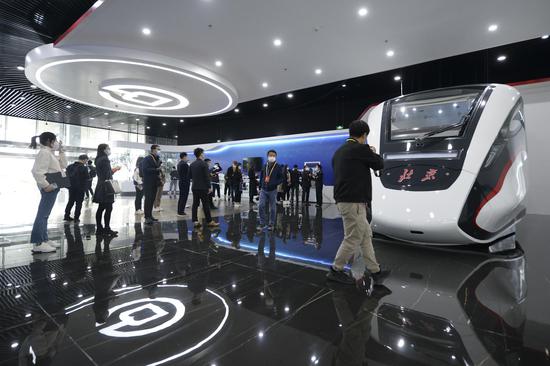







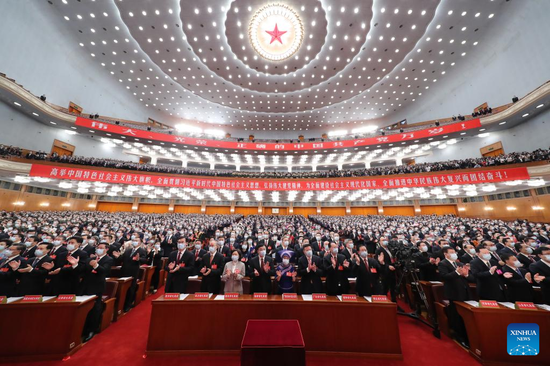




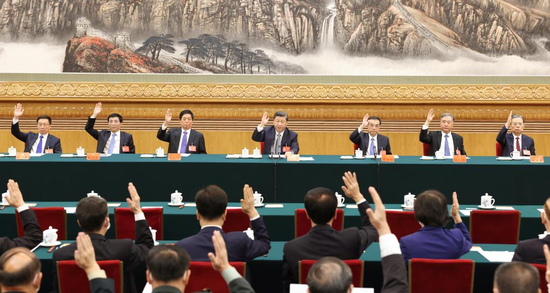
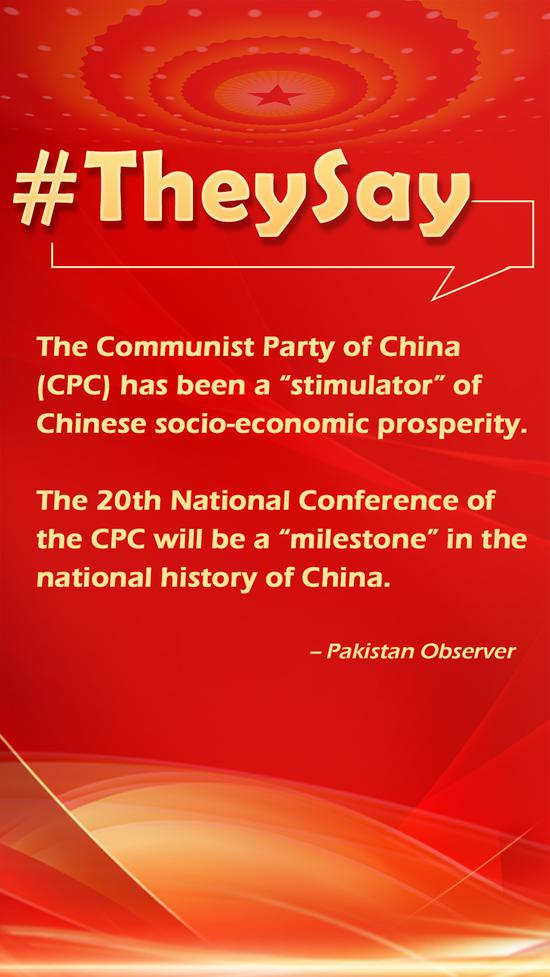




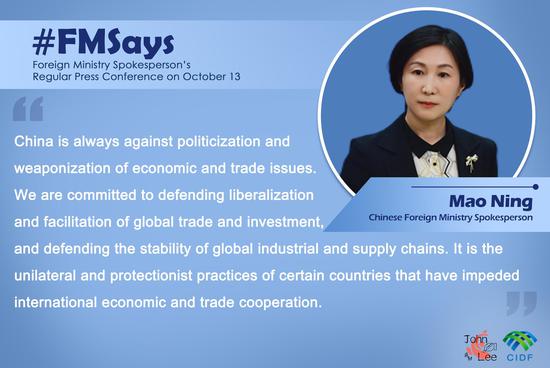
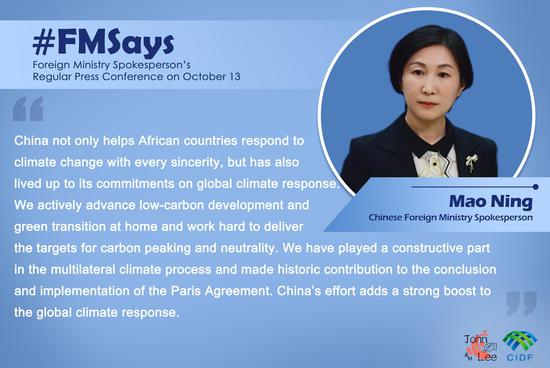










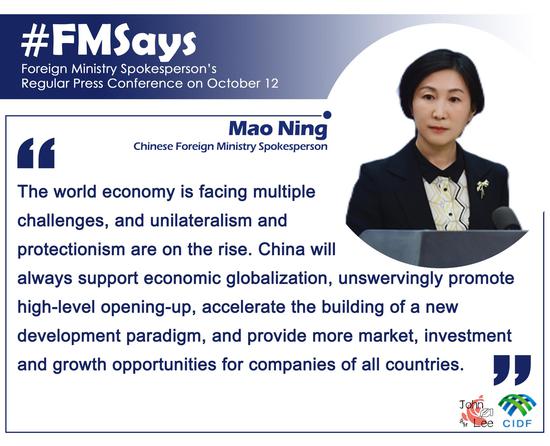
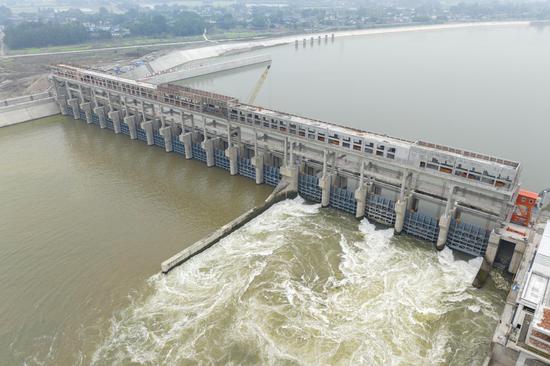






 京公网安备 11010202009201号
京公网安备 11010202009201号